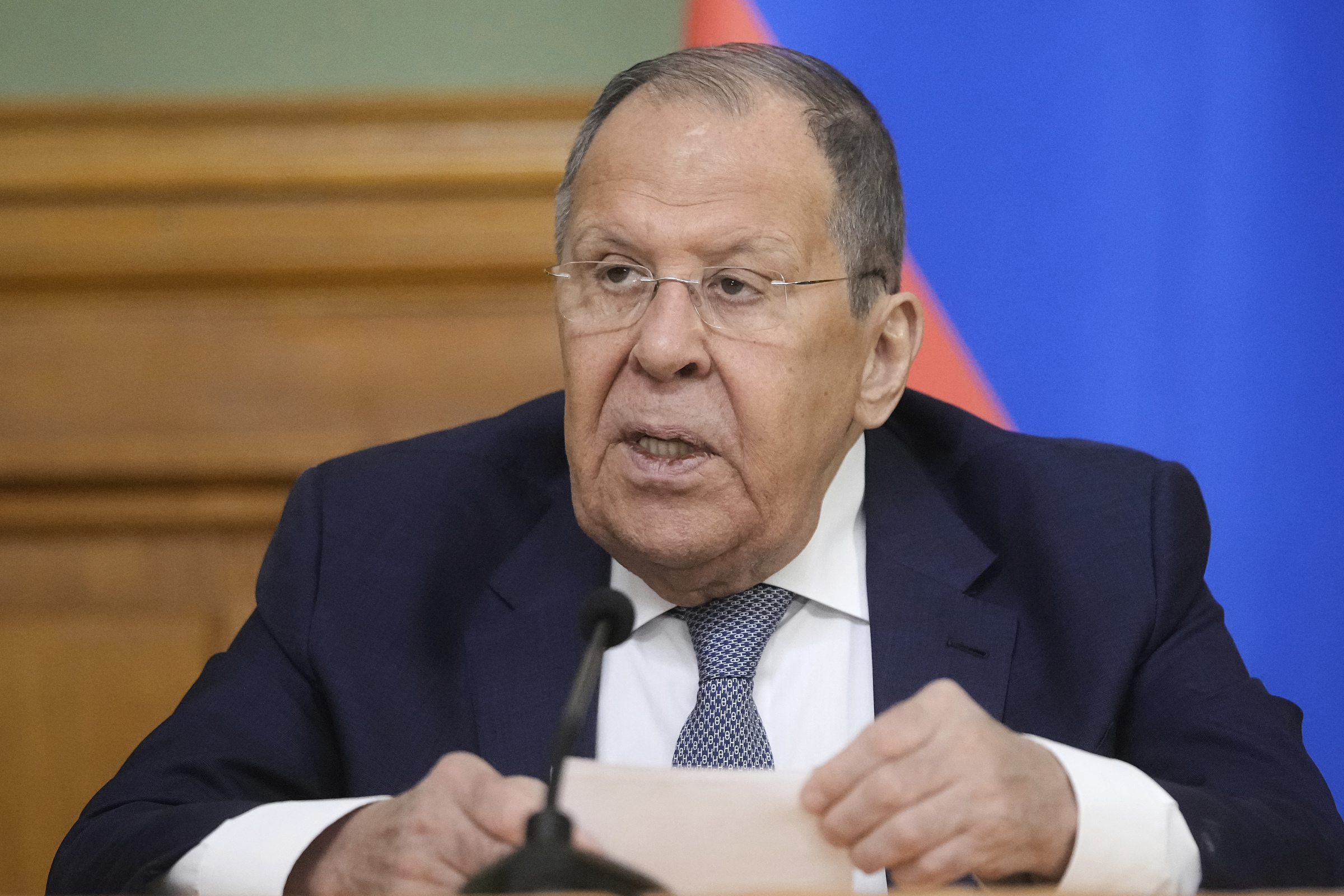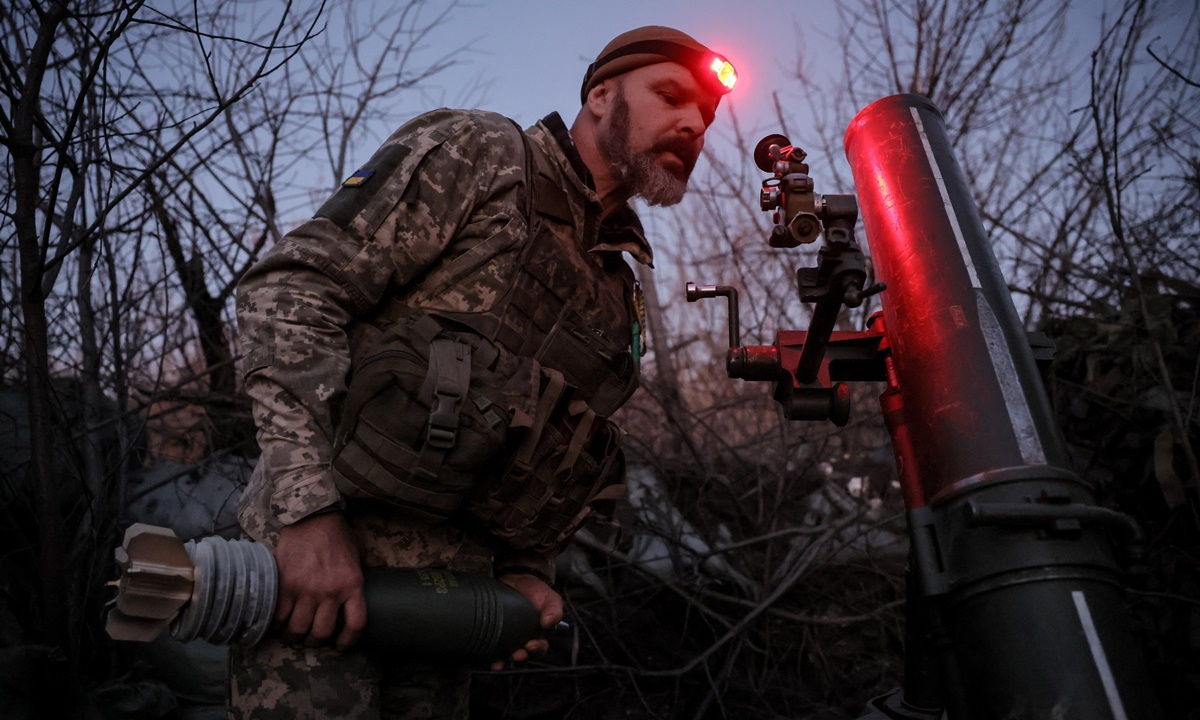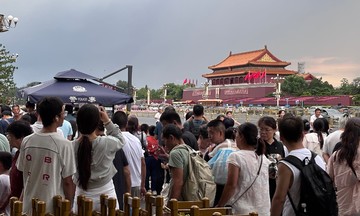Foreign Minister Sergei Lavrov stated during a press conference on 20/8, following a meeting with his Jordanian counterpart, "We cannot endorse proposals to address collective security issues without Russia. We will accept these security guarantees if they are provided on an equal basis, with the participation of countries like China, the US, the UK, and France,".
This was Russia's first comment on the idea of security guarantees for Ukraine following the meeting between President Donald Trump, President Volodymyr Zelensky, and European leaders at the White House on 18/8.
During the meeting, President Trump paused discussions with Ukrainian and European leaders for a 40-minute phone call with President Vladimir Putin. President Trump later announced that President Putin had "agreed that Russia will accept security guarantees for Ukraine," but provided no details.
 |
Russian Foreign Minister Sergei Lavrov speaks to the media after meeting with his Jordanian counterpart Ayman Safadi in Moscow on 20/8. Photo: AP |
Russian Foreign Minister Sergei Lavrov speaks to the media after meeting with his Jordanian counterpart Ayman Safadi in Moscow on 20/8. Photo: AP
Following President Trump's statement, US and European leaders discussed "NATO-style" security guarantees for Ukraine post-conflict, including the possibility of European forces deploying in Ukraine with US logistical, intelligence, and air support.
Steve Witkoff, President Trump's special envoy, stated that Russia had made a "game-changing" concession by allowing the US and Europe to guarantee Ukraine's security through a mechanism similar to Article 5 of the NATO treaty. This article stipulates that an attack on one member is considered an attack on all, prompting a collective response.
However, Lavrov's statement on 20/8, emphasizing Russia's unchanged stance on what they consider "acceptable security guarantees" for Ukraine, is seen as a setback to the nascent plan.
The idea of a NATO-style security alliance for Ukraine was initially proposed by Russia during peace talks in Istanbul, Turkey, in 4/2022. However, the West rejected this proposal because Moscow demanded to be part of the security force for Ukraine.
Russia also stipulated a consensus clause, requiring all participating nations to agree before activating any security measures.
Lavrov confirmed that these demands remain unchanged. "I believe that the West, especially the US, understands that discussing security without Russia is unrealistic, a dead end," he emphasized.
Experts believe this proposal would give Russia veto power over any post-conflict assistance to Ukraine, rendering Western-planned security measures ineffective and hindering President Trump's diplomatic efforts.
This is a strong indication that Moscow's maximalist demands throughout the conflict remain, despite President Trump's diplomatic efforts. These demands also dash hopes of progress in ending the war in Ukraine, according to Wall Street Journal commentators Yaroslav Trofimov and Georgi Kantchev.
"If Russia maintains its 2022 proposal, it's difficult for the West to make progress," said Samuel Charap, a Russia analyst at the RAND Corporation. "There doesn't seem to be much change in Russia's position."
European officials also acknowledged these differences. "I think Russia's view on security guarantees is quite different from ours," Finnish President Alexander Stubb said on 18/8.
Some analysts believe Western nations could still deploy troops to Ukraine post-conflict without Russia's consent. However, others argue that Moscow would not agree to a peace deal without precluding this possibility. President Putin has long vehemently opposed a NATO military presence in Ukraine.
"It wouldn't be surprising if that diminished Russia's incentive to agree to end the fighting," Charap said.
It is unclear whether Lavrov's message signifies Russia backtracking on the agreement between President Trump and President Putin at the 15/8 Alaska summit or if the White House misinterpreted the Kremlin's intentions. In his summit statement, President Putin also made vague remarks about Ukraine's security.
 |
Ukrainian soldiers prepare to fire mortar rounds in the Donetsk region in 11/2024. Photo: Reuters |
Ukrainian soldiers prepare to fire mortar rounds in the Donetsk region in 11/2024. Photo: Reuters
"I agree with President Trump," President Putin said. "He said today that Ukraine's security must be guaranteed by all means. Of course, we are ready to discuss this issue."
Some European leaders expressed skepticism about Russia's sincerity, suggesting President Putin is not genuinely interested in serious negotiations. "When I look at the situation and the events unfolding, I don't see President Putin wanting a peace agreement at this time," French President Emmanuel Macron told NBC News earlier this week, after meeting with President Trump and other European leaders at the White House.
President Trump seems to believe the disagreements will be resolved in a direct meeting between President Putin and President Zelensky, which he is trying to facilitate. However, the Kremlin has not confirmed any such meeting.
Alexander Gabuev, director of the Carnegie Russia Eurasia Center, suggests that with Lavrov's comments, Moscow is signaling it will not accept any pre-arranged agreements between the US and Europe without Russia's involvement.
"Moscow likely believes the Putin-Trump summit is a chance to strengthen their personal relationship and delay substantive talks on Ukraine, giving the Russian military more time to increase pressure on Ukraine at the front," he said.
Vu Hoang (Politico, WSJ, AFP, Reuters)












